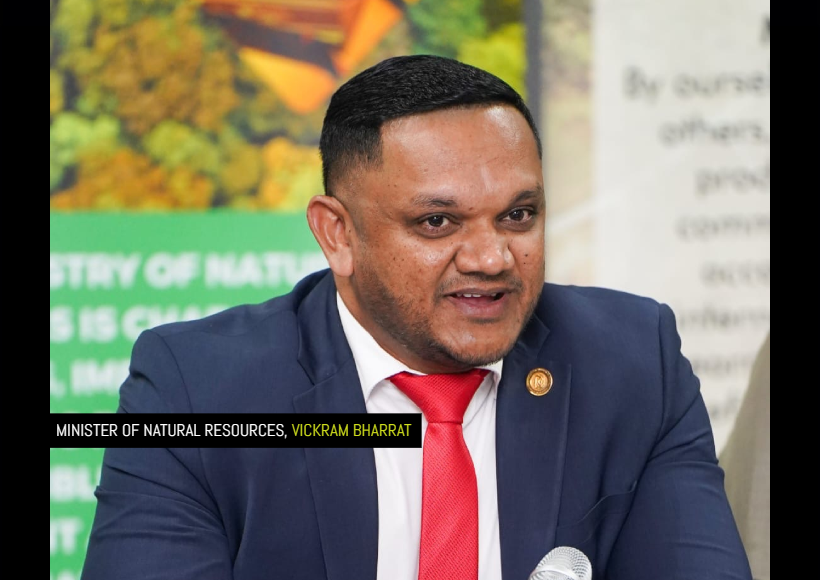Emphasizing Guyana’s ambition to excel beyond basic services in its burgeoning oil sector, Natural Resources Minister Vickram Bharrat recently underscored the government’s commitment to fostering local expertise in sophisticated industry facets.
Bharrat was at the time speaking against the backdrop of Guyana’s projected global GDP leadership, where he stressed the government’s determination to ensure that Guyanese are not left on the sidelines of the country’s oil industry. To date he said, there have been pivotal legislative strides in fostering indigenous capacity across sophisticated industry domains—especially with the Local Content Act 2021.
“Guyana is on a trajectory to maintain the world’s highest GDP for five years straight,” Minister Bharrat stated, highlighting initiatives aimed at ensuring broad-based benefits from the country’s oil wealth.
The introduction of local content legislation has been pivotal, granting Guyanese companies priority in essential services like catering and transportation, while also opening avenues in technical domains. Notably, structural fabrication opportunities, crucial for the country’s floating production, storage, and offloading (FPSO) ventures, are now accessible to local firms, supported by major projects such as Uaru and Whiptail in the ExxonMobil-led Stabroek Block.
Under these developments, Environmental Impact Assessments (EIAs) foresee substantial Guyanese involvement during drilling and installation phases. ExxonMobil and its contractors, MODEC and SBM Offshore, are pivotal in this effort, collaborating closely to integrate local workforce capabilities.
MODEC’s FPSO, Errea Wittu, slated for the Uaru Project, symbolizes a landmark in sustainable energy production, projected to yield 250,000 barrels per day by 2026. The involvement of three Guyanese firms—Guyana Oil and Gas Support Services Inc. (GOGSSI), Asequith Guyana, and ZECO Group of Services—in the vessel’s fabrication underscores the tangible benefits accruing locally from such projects.
Similarly, SBM Offshore’s FPSO, Jaguar, being constructed under its Fast4Ward®️ program, is set to enhance production capacities to 250,000 barrels per day by 2027. Building on past FPSO projects, SBM Offshore remains committed to enhancing local content by sourcing fabrication locally and integrating Guyanese professionals into their teams.
Also in an effort to broaden local opportunities, ExxonMobil Guyana recently issued a Request for Information (RFI), seeking partnerships with engineering and construction entities capable of delivering specialized services such as pipe fabrication and assembly. This strategic move aims to fortify Guyana’s domestic supply chain, ensuring sustainable growth amid evolving market dynamics.
Minister Bharrat highlighted significant investments aimed at enhancing local technical capabilities, including the recent commissioning of the state-of-the-art FPSO facility simulator, FacTor, at Guyana’s Technical Training College Institute Inc. in Port Mourant, Berbice. Spearheaded by SBM Offshore, ExxonMobil, Hess, CNOOC, and the Guyanese government, this $13 million initiative aims to bolster local competencies essential for FPSO operations, with a total investment exceeding US$100 million.
The government has unveiled a groundbreaking initiative to train at least 3,000 welders through partnerships with internationally accredited institutions like The Guyana Oil and Gas Service and City and Guilds. This endeavor aims to equip local talent with the skills necessary to contribute effectively across the entire oil and gas value chain.
Minister Bharrat affirmed these strides, noting, “Guyana’s oil sector is not just about extracting resources; it’s about building a sustainable future with our people at the helm.”
He added that, “Guyana is on a path to unprecedented growth,” Minister Bharrat concluded, “and we (the government) are ensuring that every citizen benefits from this prosperity.”













